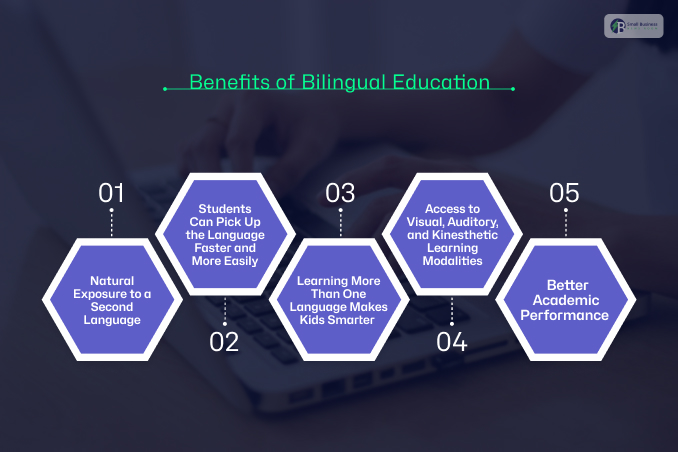Table Of Contents
Bilingual Education: How Does It Benefit Students In The Long Run?
Last Updated on: November 18th, 2024
Many parents want the best for their children. They want them to be healthy, happy, and successful in life. A lot of people focus on these three aspects of parenthood. However, they often overlook giving their children bilingual education at an early age.
In this article, you will learn what is bilingual education and how it works. Apart from that, you will learn how learning more than one language can help your child succeed in school and beyond. Hence, to learn more, read on to the end of the article.
Benefits Of Bilingual Education

The following are the major benefits of bilingual education:
1. Natural Exposure to a Second Language
Bilingual education is the norm in many countries. This means that children learn their native language, as well as another language that’s not their own.
For example, if you were born in France but moved to Canada as an adult, your children would likely learn French at school and English at home. On the other hand, it will be just the opposite if you move from Canada to France.
Bilingualism is a natural way for humans to learn a second language. Basically, everyone is bilingual unless someone has had some serious brain injuries or something along those lines!
In fact, studies show that being bilingual can actually make people smarter in some ways. For instance, it can increase your ability to focus).
However, it might seem like having two languages would be more work than just sticking with one tongue all day, every day (and sometimes it does). In fact, there are plenty of benefits. Things get different when two different languages interact with each other inside our brains!
2. Students Can Pick Up the Language Faster and More Easily
As a parent, you’re likely to have heard the term “bilingual” thrown around often. Many parents want to teach a second language to their children at an early age. However, they lack a roadmap for how to proceed with the process.
The benefits of bilingual education are numerous. In fact, you can see them throughout your child’s life by helping them pick up new languages quickly and easily. Moreover, children who learn more than one language before they reach puberty tend to be better at math as adults!
But what exactly is bilingualism? Is it something everyone should strive for through homeschooling or other methods? In the next subsection, you will learn how bilingual educational programs are so beneficial for young learners.
3. Learning More Than One Language Makes Kids Smarter
The following are some major ways bilingualism can make your kids smarter:
- Bilingualism is a skill, not an ability:For example, you can learn, master, and teach it like any other skill.
- Bilingualism is a cognitive advantage:It allows your child to learn faster and more effectively than they would if they only spoke one language. This gives them an edge over other children who don’t have this advantage. Also, this can help when it comes time for schoolwork or standardized tests like the SAT or ACT (and even later in life).
- Job Advantage:Bilingual education can provide students with an advantage when they apply for jobs. Also, it will help your children interact with other cultures.
- Social Skills:Bilingual students are also more likely to have better social skills. This can further help them in the job market.
- Competitive Edge:In the global job market, bilingualism gives students a competitive edge when applying for jobs. As a result, they get new opportunities for bilingual job openings that require language proficiency and cultural understanding.
Therefore, enroll your child in international schools in Singapore that already have an international language in their academic plan. Since it always makes it easier for children to learn a new language from a very young age.
4. Access to Visual, Auditory, and Kinesthetic Learning Modalities
Children learn better when they have access to different modes of teaching. For example, you can include the usage of visual, auditory, and kinesthetic learning modalities. In other words, children can learn by watching a video or listening to a story being read aloud by an instructor.
However, it is also important that your children have opportunities to actively participate in learning activities. For example, it gets better when they can touch things or move around (kinesthetic).
5. Better Academic Performance
The benefits of bilingual education go beyond just helping students become proficient in two languages. For instance, research has shown that bilingual education improves academic performance overall. This is because it encourages children to use all three modes of learning: visual, auditory, and kinesthetic.
In fact, according to another study, students who used only one mode had lower test scores than those who used multiple modes at once!
Hence, if you want your child to succeed, give them the gift of bilingualism. Basically, bilingualism is a gift, and it’s not just about learning a language. It’s about learning how to learn. The benefits of bilingualism last the rest of your life and help you succeed in life.
If you want your child to succeed, give them the gift of bilingualism.
Give Your Child Bilingual Education Now
Hence, you can see that bilingual education is a great way to get children started on their path toward success. You need to expose them early to a second language and give them access to different modes of learning. Thereby, you can ensure that they’ll have an edge over others when applying for jobs or interacting with other cultures.
If you want your child’s future to be bright, then consider enrolling them in a bilingual school today. Do you have any more suggestions on how to start bilingual education for children? Please share your ideas and opinions in the comments section below.
Read Also:














